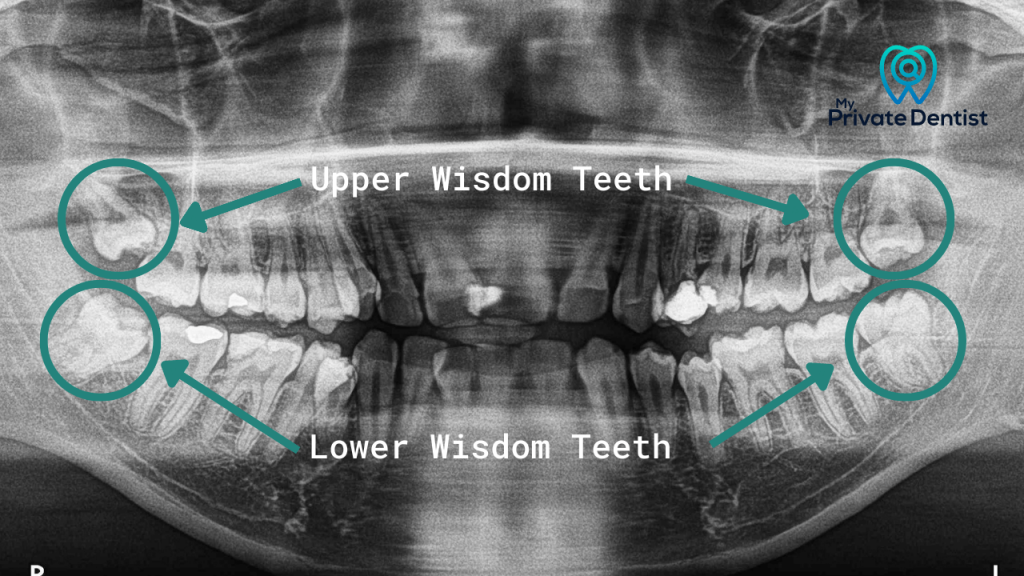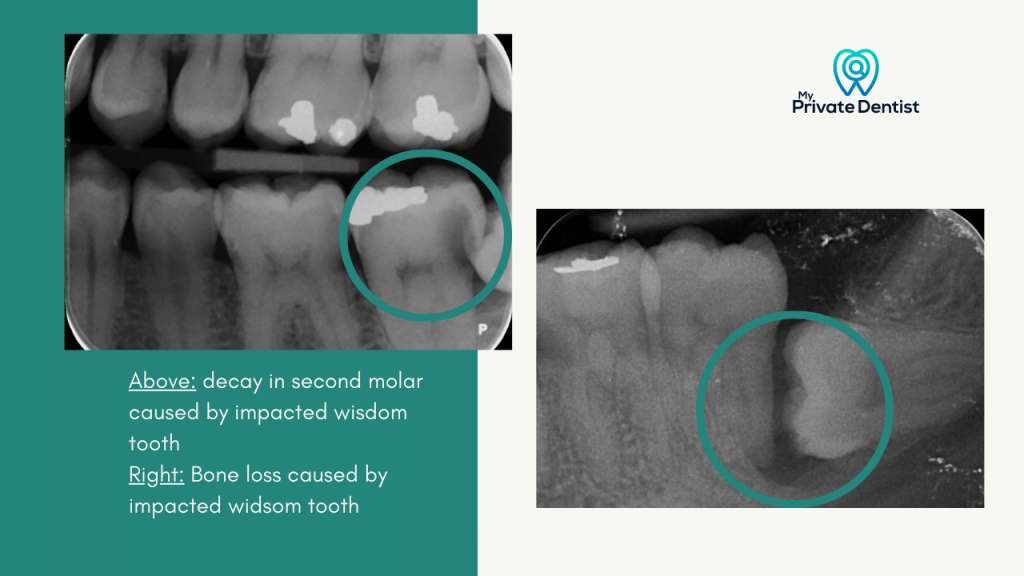What causes wisdom tooth pain?
The most common cause of wisdom tooth pain is inflammation of the gum around an erupting wisdom tooth (pericoronitis). This is due to food debris or bacteria getting under the loose gum. Cleaning the area thoroughly can help this to feel better.
Some patients have mild discomfort, while others can have a large swelling which needs immediate intervention. Where you fall on this spectrum will decide what treatment you will need. You may be able to manage your symptoms at home, need antibiotics, or require wisdom tooth removal.
As a dentist, I have seen and helped hundreds of patients with wisdom tooth pain. In the article below I will give you all the necessary information about this problem and advice on how to treat it.
What is a wisdom tooth?
Wisdom teeth, known as third molars, are the last teeth to erupt in an adult. There are four wisdom teeth in total, two in the upper arch and two in the lower arch.
They are positioned at the back of the mouth, behind the very back teeth.

They usually come through between the ages of 17 and 25.
The reason wisdom teeth cause problems is due to the lack of space for them to fully erupt. The position of these teeth makes them prone to trapping food and makes them difficult to clean effectively. Often they become stuck (impacted) when they are partly through, which means the gum around them is open and prone to inflammation and infection.
Inflammation is when the gum becomes red, swollen and painful.
Infection may present as pus, or a foul taste in your mouth. It is also associated with a swollen face or jaw.
This problem is known as pericoronitis.
Wisdom teeth are difficult to clean as they are far back in the mouth, and are prone to cavities and decay. The way they are positioned can also cause damage to the tooth in front of it.
Why do people get wisdom tooth pain?
An unerupted wisdom tooth does not commonly cause pain. Some people have wisdom teeth which never erupt in to their mouths. This is not an issue.
A common misconception is that the pain from wisdom teeth is caused by the tooth pushing through the gum. You cannot feel a wisdom tooth pushing through a gum any more than you felt any of your other teeth coming through.
Problems tend to arise when a wisdom tooth is partially erupted.

The 4 most common reasons why patients suffer from wisdom tooth pain are:
- Plaque-induced inflammation (Pericoronitis): The position of these wisdom teeth makes them hard to clean. Plaque builds around the tooth and open flap of gum, causing it to become red and swollen.
- Swelling caused by infection: If enough bacteria gets under the gum it can thrive and cause an infection. Your body’s reaction to this is to try and protect itself against the infection. This leads to swelling in your jaw or face which can be tender to touch and feel tense.
- Tooth decay: If you have been unable to clean your wisdom tooth well, it can develop a cavity and decay. If the decay starts to affect the nerve in the tooth this can be very painful. Decay can also affect the tooth in front of a wisdom tooth if there is food trapping.
- Trauma caused by cheek biting: If a wisdom tooth lacks space, it can grow towards your cheek on the inside of your mouth. This leads to cheek biting and trauma.
What are the symptoms of wisdom tooth pain?
If you are having problems with your wisdom teeth you may experience the following symptoms:
- Red swollen gum around a back tooth
- Pain due to catching/biting on the gum at the back of your mouth
- Difficulty eating
- Bad taste or bad breath
- Unable to open your mouth fully (trismus)
- Pain and swelling on one side of your face or under your jaw
Important Note: If there is a significant swelling that affects your breathing or speech, seek immediate medical attention at an emergency department. Blocked airways can be life-threatening.
Can a wisdom tooth damage other teeth?
A wisdom tooth has the potential to damage other teeth in various ways. For instance, if a wisdom tooth is growing into another tooth, it can cause resorption of the root.
Additionally, wisdom tooth impaction can result in decay in other teeth since food can get trapped between teeth and be challenging to remove. In some cases, both the wisdom tooth and the adjacent second molar may require removal. Moreover, there can be bone loss between the second and third molars due to difficulty cleaning.

How long does wisdom tooth pain last?
Some people experience recurrent short episodes of wisdom tooth pain over a period of 1-2 years as the tooth comes through. For most people wisdom tooth pain is mild, and can be managed at home.
Home remedies and wisdom tooth pain
If you have pain and slight swelling around the back of your wisdom teeth, the following home remedies can help to make you feel better:
- Brushing: Thoroughly brushing around your wisdom tooth and surrounding gum with an electric toothbrush. This will be painful but removing the plaque and bacteria can help your gum to settle down.
- Interdental aids: You can also use interdental brushes or a single tufted brush to get under the gum.
- Salt water rinses: Place a teaspoon of salt into lukewarm water and rinse for 30 seconds. This helps to remove bacteria.
- Ice pack: if your face or jaw are feeling hot and tense, placing an ice pack will help to relieve symptoms and reduce swelling and inflammation.
- Painkillers:
- Paracetamol provides effective relief for dental pain. Adults can take two, 500mg tablets at 4 intervals in 24 hours. You must wait at least 4 hours between doses, and take a maximum of 8 tablets a day.
- Ibuprofen is an anti-inflammatory pain relief medicine. Adults can take two, 200mg tablets 3 times a day.
- If pain is severe, it may be helpful to take paracetamol and ibuprofen together.
- Note: Ibuprofen, and other NSAIDs are not suitable for everyone. You MUST NOT take ibuprofen if a doctor has advised you to avoid NSAIDS.
If after 48 hours using these home remedies has not resolved your problem, you should contact a dentist for help.
How can a dentist treat my wisdom tooth pain?
There are many treatments available for wisdom tooth pain. When you see the dentist they will ask you about your symptoms, do a clinical check of the area, and take an x-ray of your wisdom tooth.
They can then decide which treatment would be best for you. The treatment that the dentist suggests is dependent on a number of factors:
- The severity of the pain, swelling and infection
- The number of episodes of severe wisdom tooth pain you have had
- The position of the wisdom tooth, and whether it is ever likely to erupt.
- Whether it is decayed or causing damage to other teeth
- Any bone defects such as boss loss or presence of a cyst.
What are the treatments for wisdom tooth pain?
A dentist will always pick the most conservative treatment to help you first, as wisdom tooth removal does come with some risks.
Oral Hygiene Advice
If your wisdom tooth pain is caused by dental plaque, the dentist will get you helpful tips on how to clean the area around the tooth better. They may suggest a specific type of electric toothbrush and Interdental aids.
Irrigation around the wisdom tooth
If the swelling is more pronounced then the dentist may attempt to numb up and clean the area using either a syringe of antibacterial mouthwash or purified water. An ultrasonic scaler can be used to carefully clean around the tooth and under the gum . This dislodges the debris that is causing the inflammation. It will take a day or two for the inflammation to subside.
Operculectomy
The flap of gum over a partially erupted wisdom tooth is called an operculum. In some cases the dentist may suggest having this removed to help ease symptoms when biting, and to stop food debris from being trapped underneath.
The operculum is removed under local anaesthetic with a scalpel or laser surgery. Results with operculum removal are mixed, as it can grow back. It is often thought to be better to let the operculum shrink back naturally over time.
Antibiotics
If you have a temperature, or difficulty opening your mouth due to swelling, the dentist may prescribe you antibiotics to help treat the infection. You will have to then try to keep the area clean to avoid re-infection.
Extraction
If you have had multiple episodes of wisdom tooth pain and infection, you may be advised to have your wisdom tooth extracted.
Should I have my wisdom tooth extracted?
In the UK we have guidelines written by NICE (National institute for Health and Care Excellence) which advise on when wisdom teeth should be extracted.
They state in ‘Guidance on the Extraction of Wisdom Teeth’:
“Plaque formation is a risk factor but is not in itself an indication for surgery. The evidence suggests that a first episode of pericoronitis, unless particularly severe, should not be considered an indication for tooth extraction. Second or subsequent episodes should be considered the appropriate indication for surgery.”
The document covers all the indications for wisdom tooth removal:
- 2 or more episodes of pericoronitis in a 6 month period
- Unrestorable decay in a tooth
- Root infection
- Spreading infection or abscess
- Internal/external resorption of the tooth or adjacent teeth
- Fracture of the tooth
- Disease of follicle including cyst/tumour
Will I need a specialist oral surgeon to remove my wisdom tooth?
If your wisdom tooth requires extraction this has to be carefully planned. A dentist would look at an x-ray to see the position of the tooth and determine how difficult it would be to remove.
Upper wisdom teeth are generally easier to remove than lower. A general dentist can carry out simple wisdom tooth extractions in practice, whereas impacted wisdom teeth require surgery. This may involve opening the gum and bone removal. Surgical procedures will need to be done by a specialist oral surgeon.


For lower wisdom teeth it is also important to check where the tooth is in relation to the Inferior Dental Nerve (ID Nerve) which runs in the lower jaw. The closer the tooth is to the nerve the higher the risk of nerve damage, which could lead to temporary or permanent numbness of the lower lip, chin and tongue.
What are the risks of wisdom tooth extraction?
All dental procedure come with some risks which you must know about before deciding to go ahead with treatment. Wisdom tooth surgery risks include;
- Generalised bleeding, swelling, and bruising
- Pain following the anaesthetic wearing off
- Damage to adjacent teeth
- Prolonged numbness from nerve damage. This risk is dependant on the proximity of the nerves to the roots of the wisdom tooth. An X-ray or CBCT scan can be taken prior to treatment to determine the risk. In some cases when the nerve is very close to the roots, the surgeon may suggest a coronectomy. This is where the crown of the wisdom tooth is removed, leaving the roots in place.
Is wisdom tooth extraction done under General Anaesthetic?
The type of anaesthetic used for wisdom tooth removal depends on the difficulty of the surgery. A wisdom tooth can be extracted under Local Anaesthetic, Sedation, or General Anaesthetic.
If you are having a single upper wisdom tooth removed this is commonly done under local anaesthetic (the area around the tooth is numbed up). If you’re having multiple wisdom teeth surgically extracted, this is more likely to be under general anaesthetic (you are asleep during surgery).
How long is the pain after wisdom tooth removal?
For simple extractions post operative pain is minimal.
If you’ve had surgery with bone removal to a wisdom tooth the healing period is longer. Post extraction pain and swelling following wisdom tooth surgery can last up to two weeks.
To aid healing you should rinse with salt water daily, brush well, and avoid smoking. Painkillers can be taken to alleviate symptoms.
Anxiety and Dental treatment
It’s important to talk to your dentist about any concerns you have about getting a tooth removed. Anxiety is common and your dentist can suggest ways to cope, like listening to music or having a supportive friend or family member with you. Delaying dental care can lead to serious problems, so it’s important to address any issues promptly.
How do I prevent wisdom tooth pain?
To prevent your wisdom tooth giving you problems you should always brush around it with an electric tooth brush twice a day. Using a mouthwash (at a different time to brushing) may also help to keep the area clean. Unfortunately in some cases infection can be unavoidable.
What should I do now?
If you’re having wisdom tooth pain, find a dentist who can help you today. If you would like to have an impacted wisdom tooth removed consider seeing a specialist oral surgeon near you.




1 Comment
Zachary Tomlinson
April 30, 2023One of my friends talked about taking a leave because of tooth pain and I got curious about how bad it is. I never knew that wisdom teeth could cause intense pain that may affect your daily routines. I will consider looking around for a dentist that can remove this for me if I need it someday.